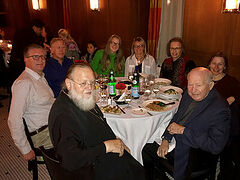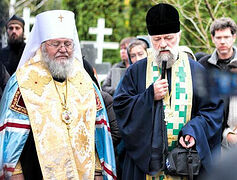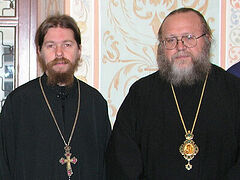On January 6, Metropolitan Hilarion (Kapral) would have reached the age of seventy-five. This was his first birthday that we marked without him. Who better to ask for memories of him than his friend of many years and deputy in the Synod of the Russian Orthodox Church Abroad, Metropolitan Mark (Arndt) of Berlin and Germany.
When in May of 2022 Vladyka Hilarion departed to the Lord, Metropolitan Mark hastened literally the next morning to New York, where I have heard he amazed many. He confessed that he couldn’t do otherwise—not out of duty, but because he just had to say good-bye to his friend.
 Metropolitan Hilarion (Kapral)
Metropolitan Hilarion (Kapral)
“I was closely tied with Vladyka from the beginning of my path in the Church. I was still a layman at the time, and he was a monk.”
As far as I was concerned this was an obvious step for me to take, even beyond my friendship with His Eminence Hilarion. I was obligated to come to the Synod, because I was the deputy to the First Hierarch. Besides, at that moment I was the highest ranking member of the Synod and had to preside over all the events after Vladyka Hilarion’s repose and up to the election of a new primate.
But of course, it was very important for me to come personally in order to honor the memory of a man who was very close to me. I was closely tied with Vladyka from the beginning of my path in the Church. We became acquainted in 1974 or 1975, when I was sent by my then ruling diocesan hierarch to the Holy Trinity Monastery in Jordanville. Vladyka Hilarion was a ryassaphore monk; he met me and, so to speak, “led” me the whole time I was in the monastery. At that time I was still a layman, and he became a monk. And a half a year later I left teaching in the university and received monasticism.
From our first acquantance I could see that Fr. Hilarion was a deeply religious man. I recall how he himself told me that when he first came to the monastery, he didn’t speak Russian at all—only the Bucovina dialect that he inherited from his parents. But in Jordanville he learned to speak perfect Russian. But most importantly, he learned to write impeccable Russian, moreover using the old orthography, which is something that few are able to do. Thanks to this he was the editor-in-chief of an Orthodox magazine that the monastery published. Of course, as a Slavic studies teacher I was amazed at this.
Naturally, Vladyka Hilarion and I served together many times. On the internet there is even information about how I participated in his consecration as bishop of Manhattan in 1984. But I can’t remember it at all (laughs). But I do remember how we concelebrated in our München cathedral, when Vladyka stayed in Germany for a few days on his way to New Zealand, Mt. Athos, and somewhere else. Or in New York, when I came to the Synod sessions.
From these services I drew that Vladyka Hilarion was always extremely kind. So kind, that we, the other hierarches, were at times displeased with it. It sometimes seemed to us that he just doesn’t know how to say “no”. But later we understood that when it was necessary to decide Church matters, Vladyka markedly defended the needed position. But on the whole, his goodness was natural, there was nothing put-on or contrived ever felt in it. He received every person with this kind-heartedness, and unfortunately many took advantage of this. For example, complete strangers would come looking for a place to spend the night, and he would put them up at the Synod. This would at times irritate the other bishops.
Helping people in need was simply in his blood. I know that to the end of his life he supported many people, and some of them still ask the Synod to continue giving them help. Vladyka sent money to Russia, to Australia, and other countries—everywhere that people asked for help.
But this relationship to people had nothing to do with any weakness of character, of which some ill-wishers accused Vladyka. He was always inherently humble, but when it came to deciding Church matters he was firm as a rock.
This includes our relationship to the reunification of the Russian Church. He and I walked this path together from beginning to end. We both understood that for a unified ecclesiastical organism, separation is unnatural. After all, the first words of the charter of our Church Abroad say that we are an inalienable part of the one Russian Orthodox Church. Of course, we did not have the right to hold on to that division longer than was necessary.
Naturally we understood that different people are now living in Russia. They are not the Russians who were brought up before the revolution, whom we knew. Their consciousness was formed differently; we were only beginning to get to know them, and in our association with them we at times took the wrong steps.
This to some extent is in regard to the ordination of Archimandrite Valentin (Rusantsova) from Suzdal, who in 1990 was appointed exarch of the Synod of bishops of the ROCOR in the USSR, and in just a few years went into schism. Both Vladyka Hilarion and I felt that we shouldn’t get involved with him. But unfortunately, other hierarchs of our Church did get involved with him—bishops who never even went to Russia. Thus a mistake was made, of which we were soon convinced.
But apparently all of us, with Vladyka Hilarion at the head, had to go through this thorny path. It was a good lesson for us. Gradually we started meeting people and we began to understand that those who live in Russia now are different people, that they were not brought up like those we were accustomed to seeing amongst the old emigration. Gradually we were able to assess the situation differently and understand that we must find the right partners.
If this had not happened, we might have begun negotiations on unification before the time, and then we would have had to come to an agreement with Philaret Denisenko, who at that time was in charge of “foreign policy” in the Moscow Patriarchate. I said many times that this was the most dangerous man in the “band”.
Glory be to God, we were able to avoid association with Philaret. Of course, we got in trouble with others, but on the whole we followed our path, and we can say that this was the right way to do it. Meanwhile, Vladyka Hilarion always expressed his views very prudently and presented thoughtful arguments on all questions. Much more prudent and thoughtful than mine. I can admit this with complete objectivity.
And when he became First Hierarch, Vladyka Hilarion did not change at all and did not suddenly become a “big boss”. No, he remained the same as he was before—a peaceful man, who disliked any zigzags or abrupt decisions. He had an even temperament, and this was a great consolation to us all. As a matter of fact, knowing his personality one couldn’t expect anything else. He always had humility and love, always remained the first among equals. For example, at the Synod meetings he never tried to “push through” a needed decision or pressure anyone. No, Vladyka always related to the other bishops as equals. And this was his relationship to all people as well.
I am sure that all our bishops now feel his presence somewhere nearby. We want to move forward in the very same direction that he determined, not breaking or overturning what was done under his leadership, but calmly proceed further along the path that we all chose.
I personally feel his presence. I often think of how Vladyka Hilarion would have reacted to one or another situation. I feel that he is here, next to us, and this feeling encourages me.




